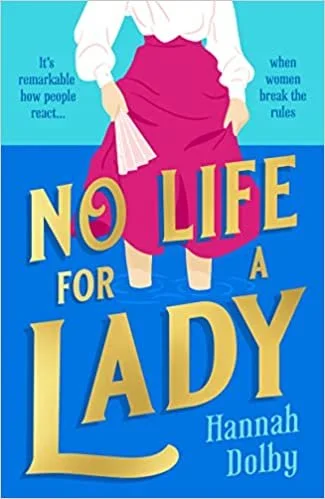Spotlight: No Life for a Lady by Hannah Dolby
/Read the most uplifting historical debut of 2023! Perfect for fans of Dear Mrs Bird, The Maid and Lessons in Chemistry.
Violet Hamilton is a woman who knows her own mind. Which, in 1896, can make things a little complicated...
At 28, Violet's father is beginning to worry she will never find a husband. But every suitor he presents, Violet finds a new and inventive means of rebuffing.
Because Violet doesnotwant to marry. She wants to work, and make her own way in the world. But more than anything, she wants to find her mother Lily, who disappeared from Hastings Pier 10 years earlier.
Finding the missing isnojob for alady, but when Violet hires a seaside detective to help, she sets off a chain of events that will put more than just her reputation at risk.
Can Violet solve the mystery of Lily Hamilton's vanishing before it's too late?"
Excerpt
We lived in a detached red-brick house in St Matthew’s Gardens, one of the many new houses that had sprung up in the town over the last half-century. The bricks were bright red-orange, untrammelled by the blackness of city smog, and it had a dark green front door with stained-glass panels on each side. We had moved here when I was ten, and I had loved it, in the early years. My mother had liked to cover any available surface with ornaments, vases, coloured lamps, family photographs, candlesticks; she had draped our furniture and our mantlepiece with bright fabrics that brought cheer to the rooms. A year or so after she disappeared, my father had arranged for many of these reminders to be packed away in the attic. He had replaced some of them with keepsakes from relatives I had never known: footstools and faded antimacassars woven by longdead great-aunts; his grandmother’s Staffordshire pottery dogs; photographs of his grandfather, who by all accounts had been a terror. But some of the shelves and surfaces stayed bare, and the atmosphere of cluttered cosiness was gone.
At breakfast the next day I faced a wall of newspaper, as I had for approximately the past ten years. Today it felt more than usually annoying.
I was a lady. I would be ladylike and rise above it. I straightened in my chair, taking a deep breath. I was an elderly spinster, patient with my lot and with the foibles of others. I was a woman, nurturing, caring. Accepting. My only goal was to foster a happy, contented home.
I hit the edge of the teaspoon I was toying with too hard with the edge of my thumb, and it flew across the table and collided with the back of my father’s newspaper with a sharp thwack.
He jumped and lowered the paper.
‘Stop it, Violet,’ he said.
‘I thought perhaps we could have a conversation,’ I said. ‘It has become a habit, your reading, but perhaps it might be pleasant to talk today?’
He raised the paper again. ‘I need to know what is happening in the world. Am I not to be allowed a moment of peace? You will get your chance when I am done.’
The Hastings Observer would give him a narrow view. ‘You did not read when Mother was here,’ I said. She had not let him, but it did not seem wise to raise that. He must have found it joyous and freeing to take up reading the paper after my mother had disappeared. But now we were chained deep within the dullness of his habit, and I hated habits. If I had a choice, people would be forced to do new and different things every single day.
He lowered the paper briefly and looked at me with a weary patience, as if I was a sack of rocks he was dragging around.
‘I have told you, I do not want that woman mentioned in this house,’ he said. He folded up the paper so that he could hold it one-handed, and then forked his breakfast into his mouth. My mother would have said it was very rude and American.
Breakfast was eggs and kippers. I also disliked kippers, at every time of day, but especially at breakfast. It was a miserable end for a herring. I thought they should all live out a long and happy life at sea, unsmoked.
Eventually he finished eating, folded up his paper and dropped it beside his plate.
‘What will you do today?’ he asked, rising. ‘My kippers were a little dry, by the way. Best raise it with…’ He made a slight vague circular gesture with his hand. ‘I have a busy day, and I may be back late. But in time for dinner.’ And he was gone, out of the door, off to his manly, worldly business at the bank.
‘Today, I will mostly be…’ I said to the air. ‘Today, I will mostly be…’ I stopped and rested the heels of my hands against my eyes for a second. I was not crying. I just needed to rest my eyes.
Buy on Amazon | Bookshop.org
Hannah Dolby's first job was in the circus and she has aimed to keep life as interesting since. She trained as a journalist in Hastings and has worked in PR for many years, promoting museums, galleries, palaces, gardens and even Dolly the sheep. She completed the Curtis Brown selective three-month novel writing course, and she won runner-up in the Comedy Women in Print Awards for this novel with the prize of a place on an MA in Comedy Writing at the University of Falmouth. She currently lives in London. You can follow Hannah on Twitter @LadyDolby
















































